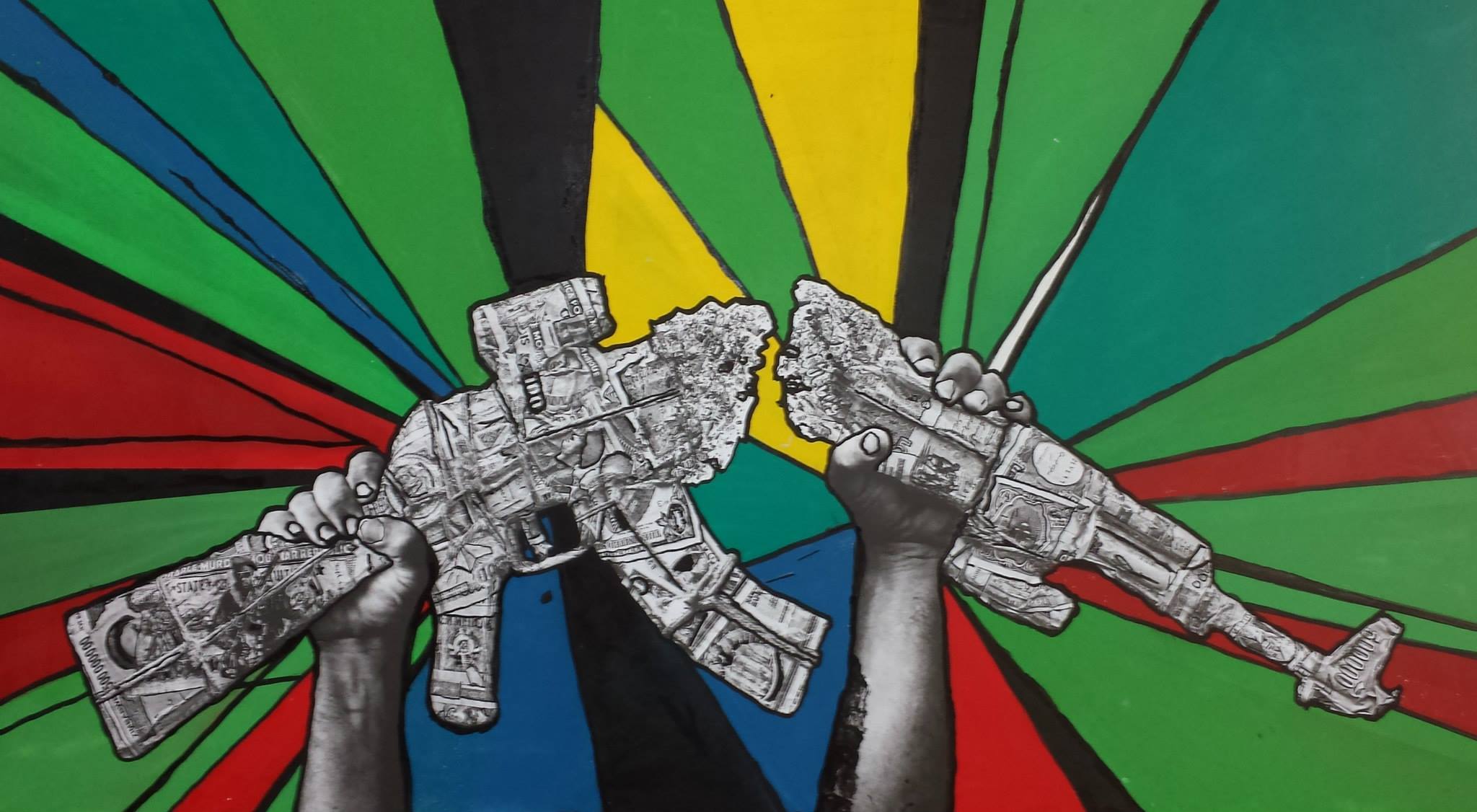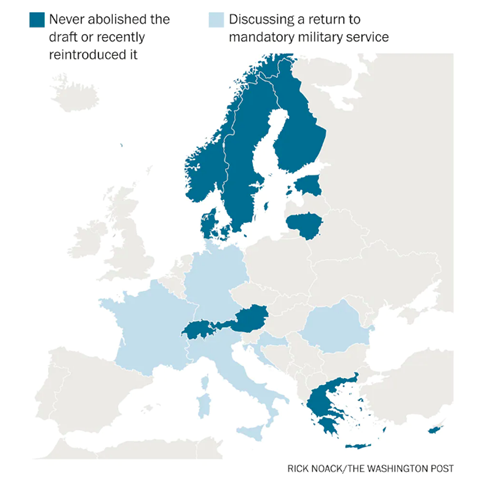The human right to conscientious objection to military service. A case study on Greece

Table of Contents
- Introduction
- Military conscription in Europe
- Conscientious objection as a critique to systemic violence
- International Human Rights Law standards
- The case-study of Greece
- Conclusions
Introduction
The research begins with an observation: in countries with mandatory military service people who identify as conscientious objectors frequently face discrimination, psychological violence, and marginalisation, both from institutions and from society, and rather than being protected they are stigmatised for their choice.
Currently, 8 out of 27 EU countries use conscription methods, namely Austria, Cyprus, Denmark, Estonia, Finland, Greece, Lithuania, and Sweden. However, while compulsory military service still remains a contentious issue in many countries, there has not been as much discussion about the role of conscientious objection; even on a practical level, the protection of conscientious objectors is not considered a priority. This is notably evidenced in Greece, which is presented as a case study to demonstrate how a democratic government may obstruct the effective enjoyment of its citizens' rights even though it recognised the instruments of international law that safeguard it.
Military conscription in Europe

Figure 1, “Military conscription in Europe”, Rick Noack/The Washington Post
The European conscription map has changed in the last decades: up until recently the draft was the norm in Europe, and compulsory military service existed in almost every European country during the Cold War and the 1990s. The debate over the meaning of conscription in the European context has been reignited in some countries, especially following the Russian invasion of Crimea in 2014, not to mention the possible effect that the current conflict with Ukraine will have in the long term in both geopolitical and social terms in Europe.
Nonetheless, in the post-Cold War security environment, several European countries have either significantly reduced general conscription, developed it to be more selective or moved completely into a professional military system . However, some of them still use some form of conscription, while some other countries are considering its reinstatement, or have already started trial processes.
Conscientious objection as a critique to systemic violence
Conscription is viewed as a controversial subject for a variety of reasons: those in favour of conscription methods advocate for the military's role in the education of young citizens, through discipline and obedience, as well as providing a first work experience while fostering the importance of national values and contributing to nation building; on the other side, those who oppose to conscription critic its effects on educational and career advancement among youth, and point at it as a tool that only creates inequality between people, while also violating individual rights and freedoms.
Indeed, regardless of the type of conscription adopted by a country, the acknowledgement of the right to conscientious objection as a basic human right does not yet receive much the attention it deserves.
Drawing on a huge body of anti-militarist feminist literature (such as the work of Cynthia Enloe and Cynthia Cockburn), military culture emerges as a political tool that contributes to the reproduction of inequalities, by delivering pre-packaged messages of an ideal kind of masculinity, which serves no purpose other than to replicate the hierarchical gender order as long as people are excluded from service based on sexual and gender identity, class, and race. In this context, the stereotype of the cisgender heterosexual christian white man is regarded as the normative soldier notion.
Conscientious objectors oppose the conventional approach to identity, rejecting the nationalistic language of self-sacrifice, questioning the military's function in moulding citizenship and the link between conscription and state loyalty by choosing not to serve, while becoming the bearers of alternative gender definitions that are not based on military service.
At the same time, the anti-militarist feminist perspective exposes all the fallacies associated with the tendency to consider the extension of conscription to women as a synonym for gender equality, which contributes instead to the rampant militarism in our societies.
International Human Rights Law standards
The right to conscientious objection to military service is not a right in itself, it’s rather characterised as inherent to the right to freedom of thought, conscience and religion, as enshrined in Article 18 of the Universal Declaration of Human Rights, later also reproduced in Article 18 of the International Covenant on Civil and Political Rights, as also recently reiterated by the UN Human Rights Council.
While the codification of the right to conscientious objection to military service is not the prerogative for conscientious objection to exist, the lack of an express right in international human rights law is a strong indication of the impact it would have against states' ability to wage war, as seen by broad rejection by nations while voting on a game-changing version of the UN Declaration on the right to peace in 2016 which provided an article dedicated to the right to conscientious objection. The sinking of such a statement is explained by the fact that in the presence of an unequivocal human right to conscientious objection, the dismantling of nations' secular ability to use ius ad bellum would no longer be an option, but a legal requirement, while conscientious objection would finally be seen as a universal human right rather than a privilege provided by states.
At the regional level, the European context has been exemplary in terms of standard-setting in recognition of the right to conscientious objection, such as with the European Convention on Human Rights and the Charter of Fundamental Rights of the European Union, although it has never recognised it as an autonomous right.
The case-study of Greece

Figure 2, “Stop prosecutions of conscientious objectors”, War Resisters’ International
Greece, where men between 19 and 45 are obliged to serve in the army, was the last EU country to recognise the right to conscientious objection in its domestic law in 1997, and a country which is believed to violate the human rights of conscientious objectors, according to the 2021 Annual Report by the European Bureau for Conscientious Objection.
As also denounced by Amnesty International, War Resisters’ International, and the Greek National Commission for Human Rights, the most critical aspects are related to the fact that statements on objection to military service are examined by a special committee which falls under the authority of the Ministry of Defence, which does not respect the requisites of impartiality and independence; the punitive and discriminatory length of the alternative civil service, which is also controlled by the Ministry of Defence. the discriminatory practices enacted between objectors, on the basis of their different grounds of objection; the case of total objectors, who refuse both the military and the civil service, therefore being charged with insubordination. They face financial and administrative consequences, from being banned from opening a bank account to being denied a passport. The trials take place in military courts, despite the civilian status of the defendants; a violation of the right to a fair and public hearing by a competent, independent and impartial tribunal, as well as of the principle of ne bis in idem, as denounced by the Human Rights Committee, given its nature as ongoing offence and the consequent repeated persecution against conscientious objectors.
Nationalist traditions and patriarchal cultural norms and practices play a role in keeping and fostering the stigma against refusers and objectors. A democratic state must measure up to its civil society, and at the same time, the human rights mechanisms should be more vigilant in this respect, ensuring that more attention is paid to conscientious objection as a human right.
Greece is among the countries where recruitment is still mandatory and refusal is not contemplated, however, the activism of many young people, their political awareness and their interest for human rights, must be something to reflect upon, their anti-militarism being an enormous value for the young generations, and an inspiration for everybody.
Conclusions
This research shows that states tend to obstruct the right to conscientious objection because conscription brings them real benefits, by increasing public support for the armed forces and contributing to the improvement of the state's military capabilities, and providing the opportunity of making a huge pool of cheap labour out of obedient and dedicated citizens.
In this context, conscientious objectors are citizens who don’t want to be used as a weapon for political control or military preparation, or to maintain social hierarchies; through their alternative performance of citizenship, conscientious objectors demonstrate that national security knowledge can be negotiated, rejecting all hegemonic narratives about citizenship created in an effort to maintain the existing political order. They openly express their beliefs as attempts to create sovereignty over their own bodies; they seek a common path outside the compulsory conscription model, embracing the feminist anti-militarist fight and demonstrating to society that the conscientious objection movement is more than a struggle against compulsory military service, it’s about the limits of democracy and the harsh reality of state power.
Conscientious objection has always been seen as a failure of citizens to fulfil their duties towards the state, and an act of betrayal to the national cause. Instead, its recognition as a human right is crucial because it implies an improvement for objectors' status, greater protection of their fundamental rights, and a standard-setting process that would bring clarity to the most problematic aspects of conscientious objection that are currently left to states.
Amnesty-Greece for the International Conscientious Objection Day, 15 May 2020

